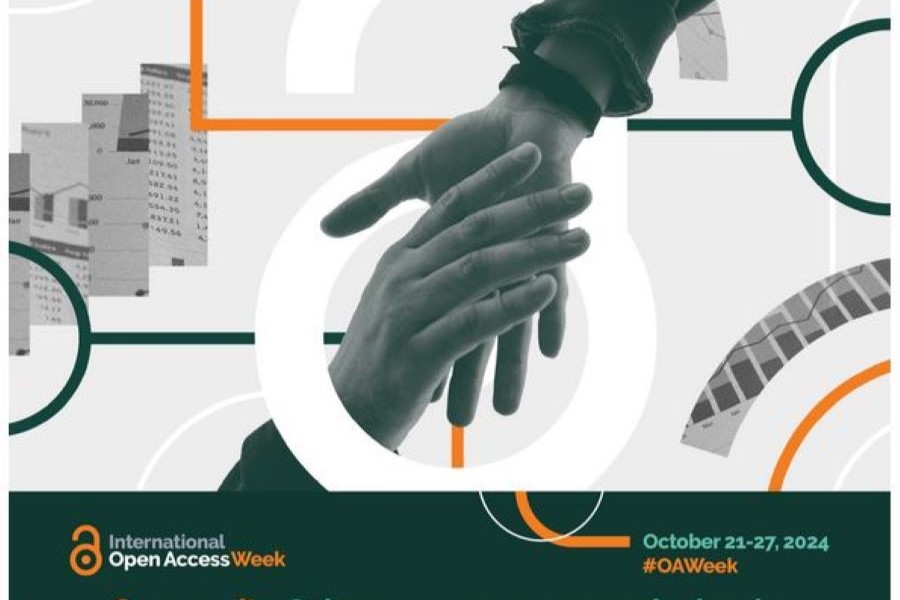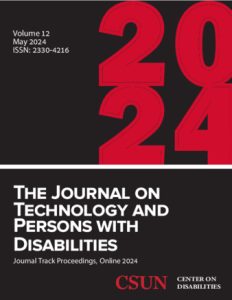Thank you to Librarian Andrew Weiss for this Cited at the Library contribution!
Open access week 2024:
Community over commercialization through open access journal publishing

Overview:
Want to publish a journal? Do it with us in the library. We have the platforms and technical expertise to support your journal’s editorial needs.
Open access week provides us a chance each year to examine the state of academic publishing and revisit the stakes of increasingly privatized access to information.
This year, we look at how you can create your own journal, publishing through the resources offered by both the CSU system and the CSUN University library.
But first, the big picture
The theme for this year’s International Open Access Week is “community over commercialization,” a continuation of 2023’s OA Week theme, borne out of “a growing recognition of the need to prioritize approaches to open scholarship that serve the best interests of the public and the academic community.”
The last year or two have seen immense changes in academia, especially with the development and implementation of AI tools across all disciplines. The disruption is felt both deeply, changing how people perceive discipline norms and practices, and widely, changing how societies value the generation of creative and scholarly works. In particular, the use of scholarly and creative works in the creation and fine-tuning of such tools, including Large Language Models like ChatGPT, raises fundamental questions about who ultimately controls and shares such information and data.
To be sure, the link of data and the AI tools exploiting it is not tenuous. Clarivate, a major academic publisher of both Web of Science and ProQuest databases, for example, is also a noted data broker, generating revenues of $1.2 billion per year. Little of this revenue finds its way back to the creators and authors of the primarily public-funded content. Information and data fuel the AI movement, displacing authorship and creator primacy in the creation of scholarship. It is too soon to understand the long-term impacts this will have on future research and creative projects, but it is not hard to extrapolate current conditions of dislocation into potential problems in the future.
Academic publishing began with the intent to share information, new knowledge, or new scientific results among like-minded researchers in their fields or societies. While it was narrower in scope, it also facilitated knowledge sharing at low cost. Ultimately, the widening of access that occurred through the development of online databases and the digitalization of content came with a price. The current online academic publishing model prizes scarcity, keeping a limit on who can access the most up to date research or new knowledge, regardless of its origins or its potential impact on the wider world. It is hard to imagine that researchers in the past envisioned such large for-profit entities controlling our aggregate knowledge through lengthy copyright terms or expensive subscription models.
It feels difficult to address the overall problems of academic publishing when we are essentially atomized in our cultures, spread across campuses throughout academia, generally divided and conquered through surveillance capitalism. Open Access itself also seems like a small movement in comparison to the multi-billion-dollar industry controlling the flow and spread of most scientific and scholarly information. To resist the pull of multinational conglomerate analytics corporations is small indeed and perhaps ultimately futile.
Yet, some effective strategies still remain open to us, especially researchers, scholars, authors, creators, librarians, and overall advocates for open science and knowledge. 
One solution: Open access journal publishing at CSUN
One way that we attempt to improve the situation, in our own small way, is through the publishing of open access journals. There are a few ways that CSUN, and the CSU System overall, provide support for open publishing, including the use of the ScholarWorks institutional repository platform, the use of the CSU Open Journal Systems (OJS), and the technical support of librarians throughout the CSU system in journal management.
At CSUN
There are five currently active open journals published through our online platform at CSUN, covering topics of geography, disability technology, taxation, and literature. These are provided freely online for all, bucking the trend of scarcity and profit-making at the expense of shared knowledge.
These journals and their editors have made it part of their mission in publishing to share the insights from the scholarship in their disciplines. Their overall economic impact may be small potatoes, perhaps a few thousands of dollars total in the face of $ billions in overall revenues for academic for-profit publishers, but the knowledge impact is incalculable.
Let’s briefly look at each of these.
The journal on Technology and persons with disabilities [12 volumes]
This journal is a companion to the annual internationally recognized disabilities conference. The journal publishes the proceedings for each conference, produced by the editors in accessible PDFs. Search in ScholarWorks for both individual articles and whole journal issues.
The New Journal of Student Research Abstracts [28 issues] 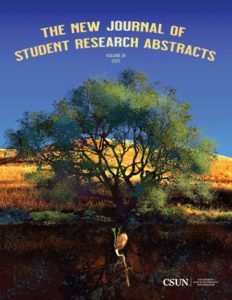
This journal, edited and overseen by CSUN Biology Professor Emeritus Steven Oppenheimer, gathers research abstracts from K-12 schools and publishes them in one volume openly in the ScholarWorks repository. Students who are accepted can see their work in print, providing a valuable citation they can use while applying to universities. The journal dates back to the 1990s and the most current issue features an introduction of support by CSUN President Beck. Search in ScholarWorks for whole journal issues.
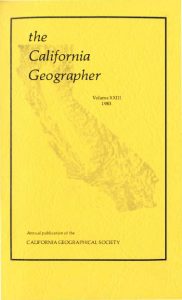
The California Geographer [62 issues]
This journal is the longest running in our stable, with back issues dating to the 1960s. This is aligned tangentially to CSUN, with Geography department faculty here providing a valuable link to the statewide California Geographical Society. Past editor includes CSUN Geography Professor Steve Graves, who helped to usher in the open access publishing of this journal, once inaccessible to CSU faculty due to paywalls. Search in ScholarWorks for both individual articles and whole journal issues.
Tax Development Journal [11 issues] 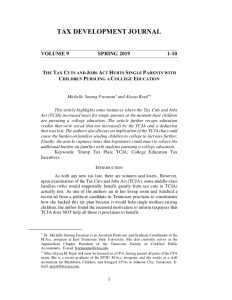
The Tax Development Journal, which started in 2009, focuses on innovative, original scholarship in the area of taxation. The primary purpose of the TDJ, edited by CSUN Professor Monica Gianni, is to provide in-depth articles on contemporary tax issues. The TDJ welcomes articles from professors, practitioners, and students. Search in ScholarWorks for individual articles.
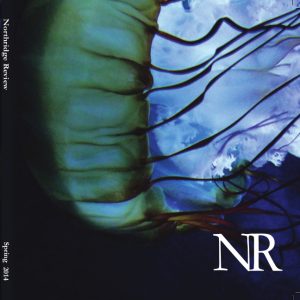 Northridge Review [74 issues]
Northridge Review [74 issues]
Finally, the student journal Northridge Review has submitted a significant number of its backfiles to the online repository. It is produced by students in the creative writing program at California State University, Northridge, with direction from English department faculty advisor Sean Pessin. Founded in 1962 as a campus publication of student work, Northridge Review publishes prose, poetry, drama, art, and hybrid texts. Print versions are produced in the Department of English’s Book Arts Lab, where they curate, design, print, and bind each edition of the NR in-house. Search in ScholarWorks for whole journal issues.
How to get started
If you are interested in starting your own new journal or wish to shift from an online web page to the ScholarWorks or OJS platforms, we have staff and librarians on hand who can help with getting started. Contact us directly if you have any questions about what we can do to help. Look here at CSU Open Journals for more information on getting a journal started.
Primary Contact
Andrew Weiss, Digital Services Librarian; CSUN Open Journal Systems campus liaison
Available through email at: andrew.weiss@csun.edu


